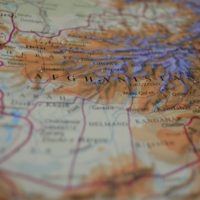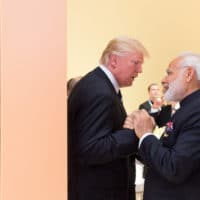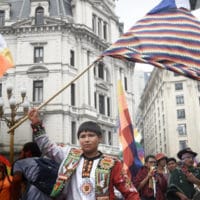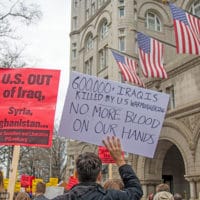-
An often overlooked region of India is a beacon to the world for taking on the coronavirus
In a pandemic, a rational person would much rather live in a society governed by the norms of socialism than of capitalism, a society where people rally together to overcome a virus; than to live in a society where fear pervades and where stigmatization becomes the antidote to collective action.
-
UN Chief warns of coming recession for the Planet
Bumping elbows at the United Nations.
-
IMF refuses aid to Venezuela in the midst of the Coronavirus crisis
On March 16, 2020, the chief of the International Monetary Fund (IMF) Kristalina Georgieva wrote a blog post on the Fund’s website; it represents the kind of generosity necessary in the midst of a global pandemic. “The IMF stands ready to mobilize its $1 trillion lending capacity to help our membership,” she wrote.
-
Why sanctions against Iran and Venezuela during a pandemic are cruel
In the midst of a pandemic, one would expect all countries to collaborate; that a humanitarian crisis of this magnitude would provide ample opportunity to end (or suspend) inhumane economic sanctions. Is this not the time for the imperialist bloc, led by the U.S., to end the sanctions against Cuba, Iran, Venezuela, and a series of other countries?
-
12 ways the U.S. invasion of Iraq lives on in infamy
While the world is consumed with the terrifying coronavirus pandemic, on March 19 the Trump administration will be marking the 17th anniversary of the U.S. invasion of Iraq by ramping up the conflict there.
-
Elon Musk is acting like a neo-Conquistador for South America’s lithium
Elon Musk, the head of Tesla, wants to build an electric car factory in Brazil. He was supposed to meet Jair Bolsonaro, the president of Brazil, in Miami in early March, but he was too busy; instead, Musk will go to Brazil sometime this year.
-
The prospect of peace in Afghanistan is real—and Pakistan is the key player
The U.S.-Taliban peace agreement signed in Doha on February 29 must be put in proper perspective. Indeed, there can’t be two opinions that the curtain is coming down on what U.S. President Donald Trump called the “endless war” in which America squandered away over a trillion dollars and lost thousands of lives with no victory in sight. Equally, without a doubt, this is the finest hour of Pakistan’s statecraft since the country’s creation in 1947.
-
Remembering the heroism of activist Berta Cáceres four years after her assassination: An interview with her daughter
On July 15, 2013, the Civic Council of Popular and Indigenous Organizations of Honduras (COPINH), led by Berta Cáceres Flores, went to protest the construction of a hydroelectric dam on the Gualcarque River. This river, in western Honduras, is considered to be sacred by the indigenous Lenca community. No one from the company that wanted to build the dam had talked to the Lenca.
-
A World no longer shaped by Atlantic powers
The annual Munich Security Conference that took place February 14-16 this year turned out to be an iconic event, drawing comparison with the one held in the same Bavarian city on February 10, 2007, where in a prophetic speech Russian President Vladimir Putin had criticized the world order characterized by the United States’ global hegemony and its “almost uncontained hyper use of force—military force—in international relations.”
-
Witnessing the hell that a migrant can face
The Saudi-UAE war on Yemen has been going on for five years. Despite recent peace talks leading to an improvement in aid distribution, the violence has escalated in certain key districts of Yemen over the past two weeks. Since January, 35,000 Yemenis have been displaced from their homes, an indicator of the dangerous situation in the country.
-
Is the World about to witness the end of the war in Afghanistan?
Neither the Indian political leadership nor the “deep state” seems to grasp that the geopolitics of the South Asian region is transforming with far-reaching consequences.
-
How India’s Modi is playing on Trump’s ego to his advantage
One thing about U.S. President Donald Trump is that he can be brutally frank. Trump recently picked up the phone and called British Prime Minister Boris Johnson to convey his displeasure over the latter’s decision to allow Huawei to operate in the UK despite Washington’s repeated urgings.
-
Standing up for Left literature—In India, it can cost you your life
On February 16, 2015, Govind and Uma Pansare went for a morning walk near their home in Pune (Maharashtra, India). Two men on a motorcycle stopped near them and asked for directions, but the Pansares could not help them; one of the men laughed, removed a gun, and shot the two. Uma survived the attack but Govind died in a hospital on February 20, 2015.
-
Bolivia: An election in the midst of an ongoing coup
On May 3, 2020, the Bolivian people will go to the polls once more. They return there because President Evo Morales had been overthrown in a coup in November 2019.
-
U.S. uneasy as Iraq gets new prime minister
The protest movement in Iraq, which is now entering its fourth month, has come to be the principal instrument for Washington to surreptitiously advance the broader geopolitical confrontation with Iran that is being played out within the country.
-
Libya is being torn apart by outsiders
Ghassan Salamé is the head of the United Nations Support Mission in Libya. He took over this job in 2017, six years after the catastrophic NATO war on Libya. What Salamé inherited was a country torn into shreds, two governments in place—one in Tripoli and one in Tobruk—and one civil war that had too many factions to name.
-
The war in Libya will never end
General Khalifa Haftar and his Libyan National Army (LNA) continue to partly encircle Libya’s capital, Tripoli. Not only does the LNA threaten Tripoli, but it is within striking distance of Libya’s third-largest city, Misrata.
-
Why the U.S. might be angling for the return of a new ‘strongman’ like Saddam in Iraq
The departure of the former Quds Force commander Qassem Soleimani is beginning to be felt in Iraq.
-
What the Right Wing in Latin America means by democracy is violence
It was a curious exchange. Frustrated by the attacks on his party—the Movement for Socialism (MAS)—former president of Bolivia Evo Morales made an audio recording in which he called upon his supporters to form militias. Maximilian Heath of Reuters went to Argentina to speak with Morales about this leaked recording.
-
The people of Colombia are cracking up the walls of war and authoritarianism
The protests that started with the national strike called by Colombia’s central union on November 21 to protest pension reforms and the broken promises of the peace accords have persisted for two months and grown into a protest against the whole establishment. And the protests have continued into the new year and show no signs of stopping.


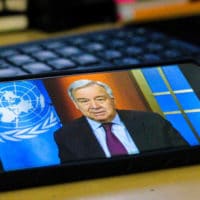

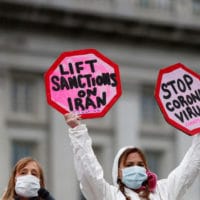


![Secretary of State Michael R. Pompeo participates in a signing ceremony in Doha, Qatar, on February 29, 2020. [State Department photo by Ron Przysucha/ Public Domain]](https://mronline.org/wp-content/uploads/2020/03/peace-signing-200x200.jpg)



